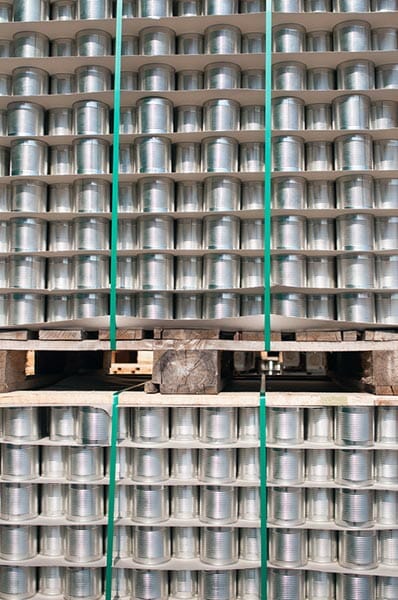Soup is big business. Internationally, the soup industry was valued at $9.29 billion in 2016, and it continues to grow. Americans consume more than 2.5 billion bowls of condensed tomato, chicken noodle and cream of mushroom soup a year. More than a million soup cans are opened and their contents used every day.
All this soup consuming would not happen without wire mesh strainers, or at least the product would be far less attractive to consumers. Whether for thick soups like cream of mushroom or thin soups like chicken broth, SaniClean’s industrial strainers play a critical role in the quality that goes into the can.
Making soup—a screening process
The variety of soups is extensive. The Campbell Soup Co. alone offers around 67 kinds of soup, each one with its own unique set of ingredients. To get an idea of the manufacturing process and the role of wire mesh, tomato soup serves as a good example.
The tomato soup-making process begins with gathering the raw materials—all the meats, vegetables and spices that make up the ingredients. Then the cooking begins. It all boils down to a three-step procedure:
Step 1: In the case of tomato soup, beef and heavy bones, along with other ingredients, are used to make the stock. These items are placed in a vat and boiled. Food-grade wire mesh in the bottom of the vat filters out the bones and other impurities.
Step 2: More ingredients are made ready to go into the soup. They are washed, chopped and, as necessary, further processed so they’re ready. This step also requires fine mesh strainers to remove dirt and debris created by ingredient processing.
Step 3: Finally, the stock and all the other ingredients are put together and cooked for a few minutes. The resulting soup is then sent through a fine-mesh wire liquid filter, which is made of brass and contains around 22 holes per inch. This “screening” removes any remaining unwanted materials.
Thus, each step in the process of making tomato soup requires the use of different kinds of strainer filters. Companies like Newark Wire Cloth, makers of SaniClean Strainers, specialize in designing and manufacturing standard and custom sanitary strainers to meet the varied requirements of a range of industries, including soup production.
Choosing the right strainer for the job
It should be clear from the description above that the soup-making process calls for different wire mesh strainer configurations. Broadly speaking, there are three categories:
- Coarse, to filter out large particles, such as bones
- Medium, for particles sized 75-1,905 microns
- Filtration, for particles from 5-74 microns
Of course, the mesh count (holes per inch) can vary widely within each category, depending on the specific needs.
Once the required mesh count has been determined, it is important to select the right strainer material. For making tomato soup stock, brass appears to be the best metal in terms of performance and cost. Another option would be stainless steel soup strainers, which could be a better material under other conditions. Strainers can be made from a wide range of metals and specialty alloys.
Many other considerations come into play in selecting the right strainer, including:
- Overall size and shape
- Product characteristics, such as temperature, density and viscosity
- Process flow rate and line size
SanClean offers a wide range of strainers which includes, duplex strainers, industrial basket strainers, Y strainers, inline strainers, and more! Soup makers are well advised to seek expert help when deciding on a strainer to serve a particular purpose. The consequences of making the wrong choice can be inconvenient and expensive in terms of downtime and labor costs. Fortunately, the better strainer manufacturers have years of experience determining what is needed, designing strainers to suit conditions and perform efficiently, and finding the most economical solution. 
Strainer facts to keep in mind
Strainers seem to be such simple tools. They aren’t known for the their moving parts or complicated construction, but:
- To be effective, strainers must be tailored to their purpose. The wrong strainer can be ineffective, increase the cost of production and even encourage growth of disease-causing microbes.
- To ensure the best choice in strainers for a given purpose, it is wise to consult with the manufacturer to discuss materials, shape, mesh count and many other factors that go into the best design, which might be a custom rather than a standard solution
For more than 107 years, Newark Wire has specialized in fabricating standard and custom wire mesh products, including SaniClean strainers to meet the sanitary standards of various industries. Contact the company for more information about wire mesh and why soup manufacturing companies rely on our soup strainer products!
